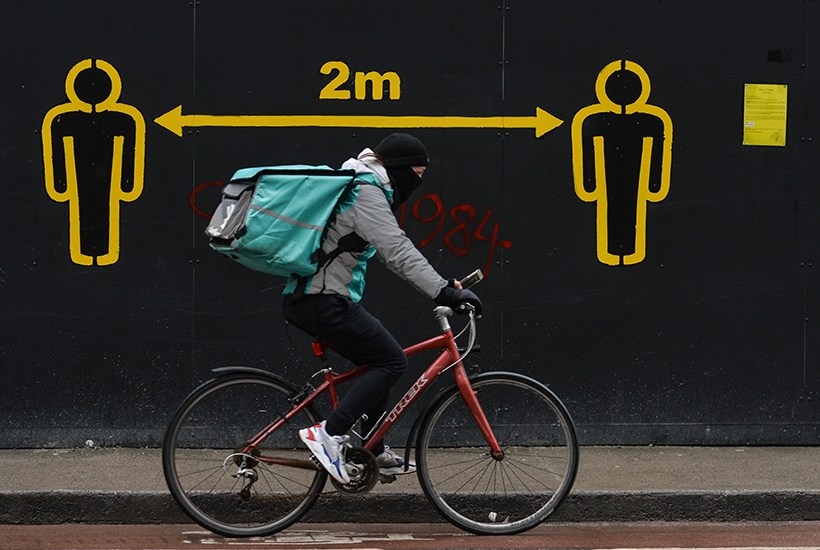Who would have thought, this time last year, that the British government would be planning to detain British nationals at the airport and keep them under guard in a hotel room for a ten-day quarantine? It’s quite a departure for a country whose values have always been defined by the defence of liberty. But we’re living in exceptional times, with the Covid death count at more than 100,000 — a bigger hit, as a proportion of population, than almost anywhere else in the world. This requires deep reflection about the mistakes made and the changes needed.
When the sick are still dying — at a rate of more than 1,000 a day — it’s hard to have a calm political discussion about what went wrong and how to get it right now. But the overall issue is simple: pursuing liberty in the short term may lead to lockdown, suppression and more death. If temporary quarantines and border closures would give us even a small chance of stopping a repeat of this nightmare, then there would be a clear argument to be made for these measures.
And yet we are not hearing an argument. Instead, discussions take place behind closed doors. This magazine was the first to disclose, only last week, that Australian-style border closures were being considered as a tool for pandemic control. A debate then followed in the cabinet about whether to quarantine everyone who arrives in Britain or just those from ‘at risk’ countries. As usual, Boris Johnson and Rishi Sunak were queasy about such measures without having a clear exit strategy. As usual, Matt Hancock and Priti Patel were less so.
But the evidence each side used to make their case remains unseen. The decisions are taken in a meeting of a Covid-O group of ministers. There has yet to be a vote in parliament. No memos, studies or explanations were issued to explain to the country — or to those who were to be detained — why this step was absolutely necessary. It would appear that detaining new arrivals under quarantine and fundamentally changing how we deal with the outside world (a settlement that may well last long after lockdown) does not even merit a debate.
There is plenty to say. The case in favour of border closures is obvious: Britain may soon be one of the first major countries in the world to vaccinate its way out of lockdown. But what if we unlock at home only to find a new variant evading the vaccine and the calamity beginning again? So we close borders just in case. It may be seen as overly cautious. But if Britain had been so cautious this time last year and closed borders then, we may have ended up with minimal Covid rates, as Australia has succeeded in doing.
This argument rests on two premises, though: that there is a vaccine-dodging Covid variant and that it can be kept out by border closures. What if neither of these is true? What do we say to those who fear years of border closure to stave off a hypothetical threat? One in four children has a foreign-born parent; the impact of border closures on families is significant. And trade: what effect would the uncertainty have on inward investment? What would this mean for the ‘global Britain’ agenda?
Then again, can we justify waiting until a new variant is at large, killing the vaccinated and — by that stage — probably beyond control? Anthony Fauci, the US pandemic chief, recently said that the South African variant diminishes but does not eliminate the efficacy of the current vaccines. And while the jabs can be updated, we can expect more new strains — and more dilemmas. Science does not give easy or quick answers on this point: so far, lab experiments on the new variants test against antibodies but not other parts of the immune system.
‘The precautionary principle has priority,’ said Angela Merkel when extending lockdown in Germany last week: in other words, the potential damage of a runaway infection outweighs the undeniable damage of restrictions. Hancock is now using the same language, saying that ‘the precautionary principle applies’. We can expect Britain will be quicker to lock down in future: we were the only country, for example, to close our borders to Denmark after the mink farm variant scare. That proved to be a false alarm, but also underlines how quickly Britain is prepared to move.
Labour and the Lib Dems have a simple policy: argue for even tighter restrictions, internally and on borders. The Scottish National party say they’d go even further. With no opposition to border closures in Westminster, there is a grave danger that policies are not properly examined or explained. As Nigel Lawson once observed, consensus in parliament creates the circumstances for huge mistakes to be made, and go uncorrected. But there is enough diversity of opinion in the backbenches to tease out the government’s thinking.
This virus has killed (and is killing) more people in this country than almost any other. Aussie-style border closures are a powerful tool — but to what extent do the tools address the problem? What would we gain, and what would we lose? What is the surest route to protecting liberty while minimising future deaths? Decisions being made now will not just be about temporary measures, but what kind of country we wish to emerge into once the second wave is over. People deserve to hear the full case for the decisions shaping their lives — and there is no substitute for open, democratic debate.
Got something to add? Join the discussion and comment below.
Get 10 issues for just $10
Subscribe to The Spectator Australia today for the next 10 magazine issues, plus full online access, for just $10.
You might disagree with half of it, but you’ll enjoy reading all of it. Try your first month for free, then just $2 a week for the remainder of your first year.














Comments
Don't miss out
Join the conversation with other Spectator Australia readers. Subscribe to leave a comment.
SUBSCRIBEAlready a subscriber? Log in